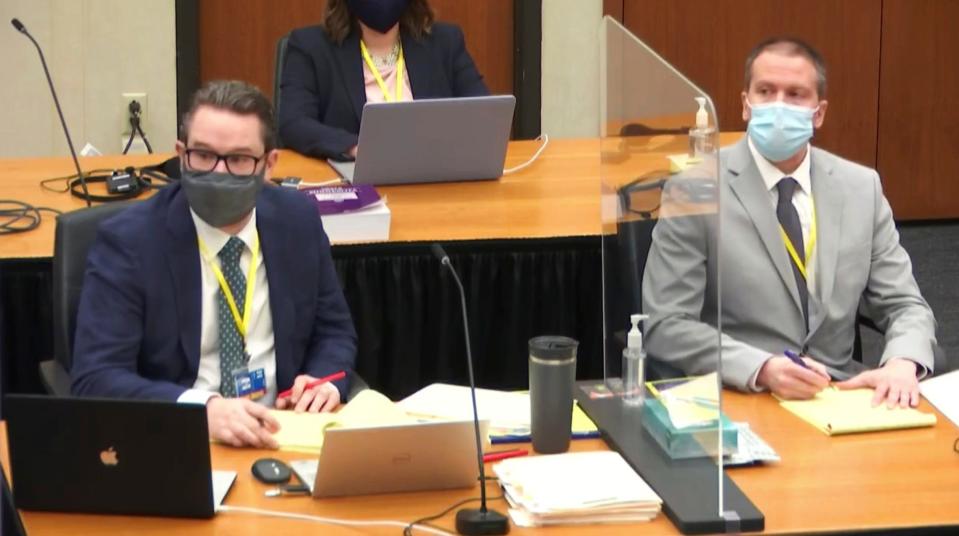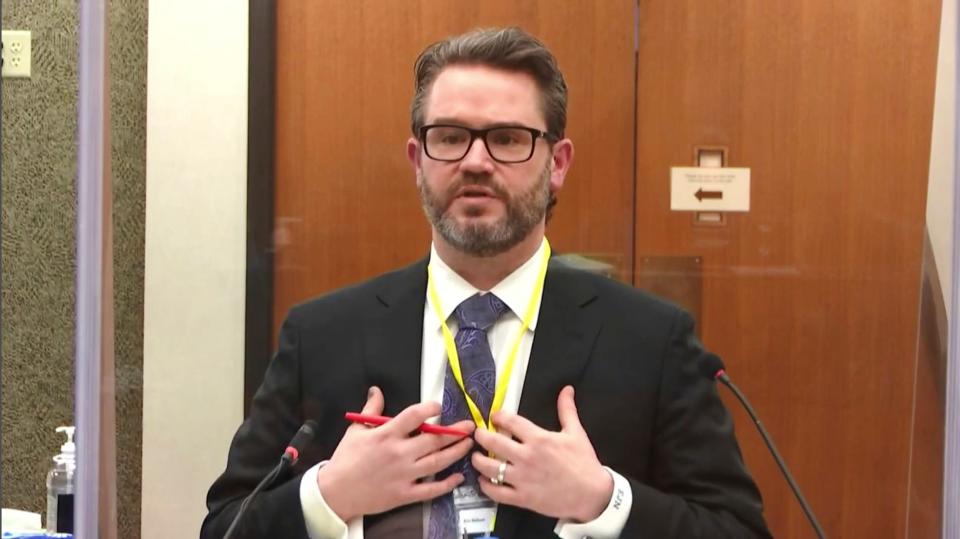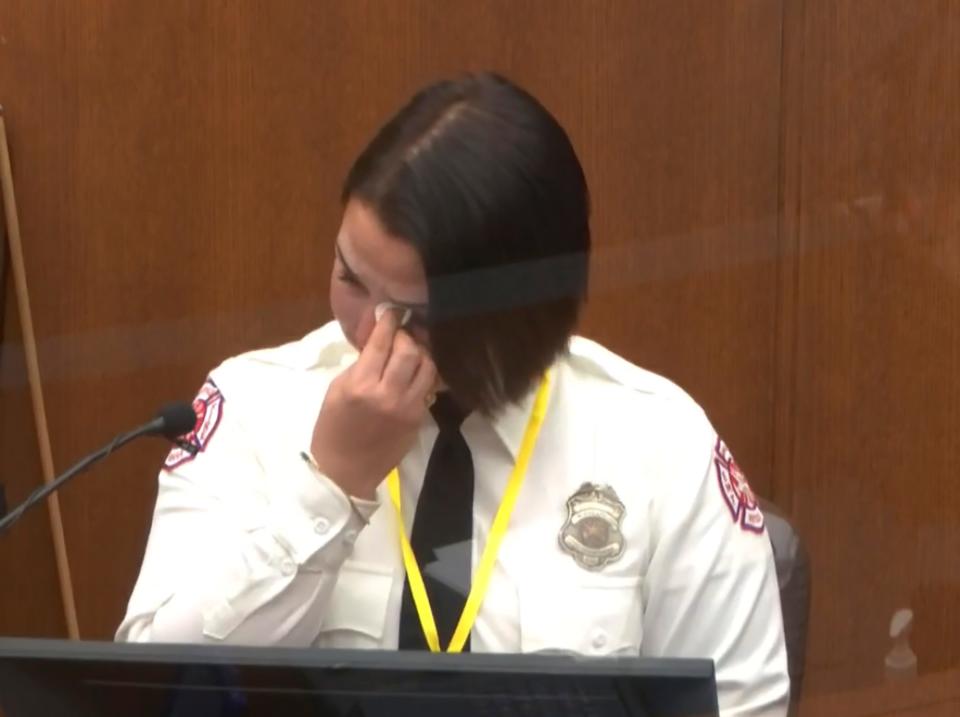The judge in the Derek Chauvin case is orchestrating one of the nation’s most widely watched murder trials. Meet Peter Cahill.

MINNEAPOLIS – It's no small job to preside over the most emotionally charged criminal trial in the country. There are throngs of lawyers, reporters, tearful witnesses, social media fanfare, complex legal questions, and all the while the possibility that an appeals court will second-guess you.
That is exactly where Hennepin County District Court Judge Peter Cahill finds himself in the murder trial of Derek Chauvin, entering its sixth week and bringing daily controversy and scrutiny to every step taken in the courtroom.
For the first time in Minnesota state court history, cameras are livestreaming the historic case, which many see as putting the nation's police practices on trial in the killing of George Floyd. The decision to allow livestreaming was made by Cahill due to immense global interest and limited courthouse space.
While the 62-year-old former prosecutor and public defender has opened up the courtroom in one sense, he has been very strict in another. With such intense interest and so many eyes watching, Cahill, whose colleagues describe as a taskmaster noted for running tight courtrooms, has ruled with a stern hand. He publicly admonished a combative witness, reprimanded the press, and scolded a witness's public relations representative for snapping a quick photo in the barricaded courthouse.

"He has had a few curveballs thrown at him throughout this thing," says Michael Brandt, a longtime Twin Cities criminal defense attorney who has appeared before Cahill many times. "He handled that with some grace and aplomb."
Cahill has set strict deadlines and stuck to his "relatively rigid timeline," Brant said. A "taskmaster kind of philosophy has permeated this, but not in an aggressive, overbearing way – more in way of, we’re going to keep these trains on time."
But few things go according to plan in a major trial. Days before the start of jury selection, an appeals court ruled that Cahill should not have thrown out a third-degree murder charge against Chauvin last fall. Then, at the end of that week, the city approved a historic settlement for the Floyd family, which threatened to derail jury selection.
"Judge Cahill definitely has control of that courtroom," said Hennepin County Chief Judge Toddrick Barnette, who picked Cahill to preside over Chauvin's trial and the separate trial of the three other officers charged in Floyd's death.
Chauvin is charged with second- and third-degree murder and second-degree manslaughter; the other officers are charged with aiding and abetting those crimes.
'They need to be watched': How livestreaming the Derek Chauvin trial lets people of color monitor the justice system
A roadblock on the first day of jury selection
Jury selection was supposed to begin on March 8. Artists and activists gathered outside the fortified courthouse as attorneys huddled inside, separated by plexiglass to prevent the spread of COVID-19.
Instead, the day started with a confusing debate over whether jury selection could continue before the court knew for sure what charges Chauvin would face.
The issue arose days before when the Minnesota Court of Appeals said Cahill should not have thrown out a third-degree murder charge against Chauvin last fall.
Eric Nelson, the lead defense lawyer, said he planned to ask the state Supreme Court to review whether Chauvin could face the additional murder charge. Prosecutors with the Minnesota Attorney General's office scrambled to ask the appeals court to halt jury selection while the appeal was underway.
If the trial was to move forward and Chauvin was to be convicted of third-degree murder, it could cause problems for the state on appeal. If the appeals court were to rule that Cahill shouldn't have proceeded with jury selection, the conviction could be thrown out and Chauvin could not be tried again for the same offense under the constitutional protection against being tried for the same crime twice.
Cahill called a recess the morning of March 8 to let attorneys file an appeal, but with no word from the appeals court by that afternoon, he sent potential jurors home and made it clear he wasn't going to put the trial on hold while they waited for the appeals court.
“Unless the Court of Appeals tells me otherwise, we’re going to keep going,” he said.
The day ended without a single juror stepping foot into the courtroom.
Jury selection proceeded the next day. On Wednesday, March 10, the Minnesota Supreme Court rejected the defense's appeal. On Thursday, March 11, Cahill opened proceedings by hearing arguments on reinstating the third-degree murder charge against Chauvin. He ultimately granted prosecutors' request to reinstate it.

Mary Moriarty, former chief public defender of Hennepin County who has appeared before Cahill multiple times, noted that he "didn't take the easy way out by just reinstating the charge" right away. Instead, he gave the lawyers time to appeal.
"He did that probably because he wants to avoid any potential appeal issue," she said.
"The last thing a judge wants is to have a case reversed on appeal because that means not only did they make a mistake, but the standard on appeal usually means the judge has abused their discretion in some way," she said. "He's made a good record, and he’s also allowed the lawyers to make a good record."
Defense argued civil settlement tainted jury pool
The day after settling the issue of the additional charge, another bombshell: After Cahill called a recess for lunch, news broke that the city had settled the Floyd family's wrongful death lawsuit for $27 million.
During a press conference with Mayor Jacob Frey and city council leaders, family attorney Ben Crump hailed the agreement as the largest pretrial settlement in a wrongful death case ever.
Cahill, who was at that point a friendly face for nervous potential jurors, expressed frustration more than once after the announcement.
The civil case is a separate legal matter, but when the court reconvened Monday morning, March 15, Nelson argued the announcement had tainted the jury pool. Nelson asked Cahill to delay the trial, move it to a new location and sequester all jurors for the duration.

Cahill had ruled against a similar request months before, but he said he would consider it. He ordered the seven jurors that had been selected already to be questioned about their exposure to the news. He called the timing unfortunate but said he didn't suspect any "evil intent in the timing," which he said probably stems from the city's desire to limit its liability.
"I wish city officials would stop talking about this case so much," Cahill said at one point.
The next day, no new jurors were selected.
By Wednesday, March 17, Cahill brought back all the jurors who had been selected for questioning. He appeared frustrated when two jurors said the settlement had influenced them. He dismissed both from serving.
Stress of the trial shows
Cahill's temper has flared, but almost never in front of the jury.
"This is an extremely stressful trial, as any murder trial is," Moriarty said. "The jury hasn’t seen any of that, so I think he’s done an excellent job there."
During the second week of jury selection, Cahill got visibly angry and reprimanded the press for reporting on lawyer's notes on a table and describing security throughout the courthouse. He threatened to kick out the media and shut down the media center across the street if the media didn't act responsibly.
As Nelson's cross-examination of Minneapolis firefighter Genevieve Hansen got heated in the first week of testimony, Cahill sent the jury out of the room. He admonished Hansen to answer the questions.
"Do not argue with the court," he told her. "I will determine when your answers are finished."

Brandt said Cahill's "buttons got pushed," but he was able to assert himself without compromising the witness in front of jurors.
Right after admonishing Hansen, Cahill called a public relations representative for Darnella Fraizer, who had testified about the video she recorded of Floyd's death. The woman had taken a photo of the 18-year-old with Attorney General Keith Ellison.
As Cahill held up her cellphone, he said he would chalk it up to being ignorant of the rules against taking photos inside a courthouse. He instructed her to delete the photo.
Past experience and why he got the job
Cahill started his career as a public defender, then moved to private practice. In 1997 he joined the Hennepin County Attorney’s Office, spending 10 years there and eventually serving as the chief deputy county attorney.
He was appointed to the bench in 2007 by former Republican Gov. Tim Pawlenty and has been reelected to his position twice. His current term expires in January 2027. After his reelection in 2014, he told his local newspaper in Plymouth, where he lived for at least 25 years with his wife and four children, that his favorite part of being a judge is presiding over jury trials.
During his time as chief judge, Cahill presided over one of Minnesota's problem-solving courts, which aims to prevent women on probation for prostitution charges from reoffending.
Barnette said when he was selecting a judge for the case, he looked for someone who could make legal decisions under local, national and international pressure. "We needed a person that this moment wasn’t too big for," he said.
Last year, Cahill sentenced figure skating coach Thomas Incantalupo to 24 years in prison for sexually abusing one of his figure skaters. In 2019, Cahill sentenced Kenneth Lilly to seven years in prison after Lilly pleaded guilty to shooting a school bus driver while a student was on board.
In 2015, Cahill issued a 137-page decision after dismissing charges against organizers of a large Black Lives Matter protest at Mall of America.
Andrew Gordon, an attorney who appeared before Cahill during that case, said Cahill is a "big fan of courtroom efficiency" who marshaled the BLM case well and is likely doing the same thing in the Chauvin trial.
"Cahill is used to the limelight. He has handled complex matters before," he said. "He is up for the challenge."
Contributing: Tami Abdollah, USA TODAY; The Associated Press
Follow N'dea Yancey-Bragg on Twitter: @NdeaYanceyBragg
This article originally appeared on USA TODAY: George Floyd: Who is Judge Peter Cahill in the Derek Chauvin trial?

 Yahoo Movies
Yahoo Movies 
